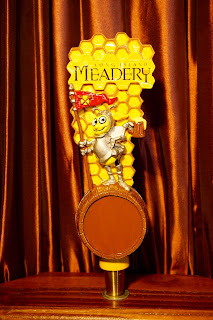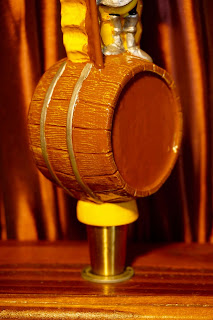Tap Handle #640: Long Island Meadery
Tap size: 10.5"
Rarity: less than 10 seen, hand-made, brewery closed
Mounting: 3/8" ferrule on 5/16" anchor bolt
Rarity: less than 10 seen, hand-made, brewery closed
Mounting: 3/8" ferrule on 5/16" anchor bolt
What a great tap this is! I previewed this tap in a recent anniversary post, where I stated that mead is made with honey, thus the the bee and honeycomb on the tap are a great tie-in to the product. There are lots of great details to be seen here, from the suit of armor the bee is wearing (a nod to the medieval festivals that owner Paul Holm was fond of), to the flag the bee is holding, to the oak barrel it is standing on, to the dozens of geometrically-shaped honeycomb sculptings. The bee even has four arms! One of the bee's hands holds a foaming mug, which is curious because mead looks more like wine than a foaming mug of beer. The barrel holds a place for a label but I would bet that labels are even harder to find than the tap. Without a label, I decided to profile the Meadery's Traditional Mead, since it has the most reviews of all of their varieties on Ratebeer. My overall impression of the tap is that it is brilliant and colorful, and also extremely scarce, since the Long Island Meadery has been closed since about 2010. In fact I've never seen another on the secondary market - only a photo from another collector.
Click through to read more about Long Island Meadery, their Traditional Mead, and to see more photos of this whimsical tap...
Long Island Meadery was founded in Holbrook, New York in 2004 by Paul Holm. A long-time worker for the Long Island Railroad, Holm’s first taste of mead came in 1990 while he attended a two-week medieval festival organized by the Society of Creative Anachronism, and he was hooked, although by his standards the mead was not very good. Determined to create a better version, within two weeks he was making it in his own kitchen. Eventually, he made so much that his kitchen was rendered useless for anything beyond mead making. That’s when he decided to rent some space, get some equipment, and go commercial with his creation.
In 2004 he formed Long Island Meadery, locating the business in an 1800 square foot warehouse space in an industrial park in Holbrook, which he chose based on its two powerful air conditioners - temperature control is important when making mead. His production room consisted of steel fermentation tanks, a fruit press to add fruit flavoring to the mead, small oak barrels which he used for an oak-aged apple ceyser (mead made with apples is called ceyser), and barrels and large buckets of orange blossom honey from a farm in Pennsylvania. Because all of his products were flavored with fruit, he used the orange blossom honey because he felt it was the best match with the fruit flavors. He also used dry and semi-sweet wine yeast to avoid making the the mead too sweet.
At the 2005 International Mead Festival and the 2006 Great Lakes Olde World Cider competition, Long Island Cyser earned gold medals. By 2007, Holm was producing 1,300 gallons of mead per year, with a traditional clover honey unflavored mead, 10 varieties featuring fruits, and even a root beer mead. He outgrew his traditional distribution at medieval fairs and food markets, and signed up with a distributor to sell mead in 30 stores in New York City and on Long Island. On Friday nights and weekends, Holm would make his small tasting room in the warehouse available for visitors to try samples, buy bottles, and purchase souvenirs.
Holm’s future plans were to make braggart (Welsh ale made from honey) at a brewpub, and to make honey-based spirits at a distillery. But due in part to colony collapse disorder (CCD), which was decimating bee populations, and in part by a reluctance by consumers to try mead, Holm was forced to close the Meadery around 2010. He joked that once people tasted mead, they liked it...but getting them to try it in the first place was the hard part.
Long Island Meadery Traditional Mead was made with 100% clover honey fermented into a sweet mead with a taste of clover. Recommended food pairings were salads, fish, and light meats.
Ratebeer weighted average: 3.48 out of 5
Beer Advocate: no entry
Source Material


























Comments
Post a Comment